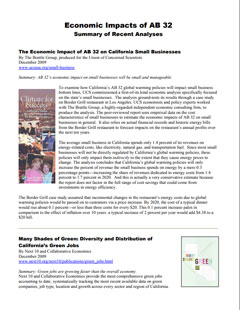- LA Case Study Report (PDF)
- LA Case Study Executive Summary (PDF)
- San Diego Case Study Executive Summary (PDF)
- San Diego Case Study Executive Summary Spanish (PDF)
- San Diego Case Study Report (PDF)
In 2006, California passed into law Assembly Bill (AB) 32, the Global Warming Solutions Act, which requires the state to reduce its global warming pollution approximately 12 percent below current levels by 2020. Many have asked, “How will AB 32 affect small businesses specifically?”
To answer this question, the Union of Concerned Scientists, in 2009 commissioned the Brattle Group to develop an estimate of AB 32’s likely effect on energy prices in California and the resulting year-to year impact on small businesses between 2010 and 2020. The analysis uses an actual business in the Los Angeles area—a Mexican restaurant called the Border Grill—as a realworld example, based on the restaurant’s financial records and energy bills.
The Bottom LineIn 2010 UCS commissioned the Brattle Group to update the 2009 report. Released in October of 2010, the update incorporates newly available energy market data and a new small business case study, using the Chula Vista-based grocery store Mercado International 2000.
Even if California’s small businesses do nothing to decrease their energy use through energy efficiency or other means over the next 10 years, they will likely experience only a small and manageable impact from the state’s policies to reduce global warming pollution. These policies would also enable California to benefit from the new technologies and jobs that characterize a low-carbon economy.
On the other hand, if global warming is allowed to continue unchecked, it is expected to cost the United States hundreds of billions of dollars by the end of the century. California’s recreation, tourism, agriculture, real estate, and forestry businesses could suffer severe damage.
What most small businesses can expect
The Brattle Group analysis shows that AB 32 would cause small increases in the price of electricity, natural gas, and transportation fuels. The financial impact of these price increases on small businesses depends on the ratio of a business’s energy expenditures to its total revenues. This ratio can be affected by a business’s ability to respond to higher energy prices by conserving energy, investing in energy-saving equipment, or raising its prices.
On average, California’s 700,000+ small businesses currently spend 1.4 percent of their revenues on energy. If AB 32 policies are implemented, that figure would rise to 1.7 percent by 2020. This projection assumes that small businesses do not pursue incentives, rebates, and other programs that would help lower their use of electricity, gas, and transportation fuel. By investing in energy efficiency, most small businesses could lower their energy costs significantly.
What the Border Grill can expect
Under the same conservative assumptions, the Border Grill could completely absorb the small increase in energy costs related to AB 32 by raising the price of a $20 meal less than three cents in 2020. That pales in comparison to the effect of inflation over 10 years: a typical increase of 2 percent per year would add $4.38 to a $20 bill.
What the Mercado International 2000 can expect
The 2010 report reaffirmed its previous finding that AB 32 will not significantly impact small businesses. In the Mercado case study, despite the fact that grocery stores are a highly competitive sector, the entire impact of AB 32 could be completely offset by retail price increases of, at most, 0.1 percent—so small as to be virtually unnoticeable to customers.
Resources:
Small-business owners who support efforts to achieve clean energy, fossil fuel independence, and climate security—or have questions about how to make changes or get more involved—can obtain information and assistance from the following organizations:
California Business Alliance for a Green Economy Susan Frank, coordinator (650) 450-5580
Small Business California Maureen Porter, membership coordinator 2311 Taraval Street San Francisco, CA 94116 (415) 680-2188
California Air Resources Board:Small Business Actions for Climate Change La Ronda Bowen, small business ombudsperson, Office of the Chair 1001 I Street Sacramento, CA 95812 (916) 327-5762
Greenlining Institute Green Assets Program (focusing on minority/women-owned businesses) Tara Marchant, program manager 1918 University Avenue Berkeley, CA 94704 (510) 926-4001
Green For All Capital Access Program (focusing on minority/women-owned businesses) Nick Flores, program manager 1611 Telegraph Avenue, Suite 600 Oakland, California 94612 (510) 271-9832




